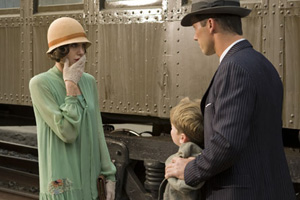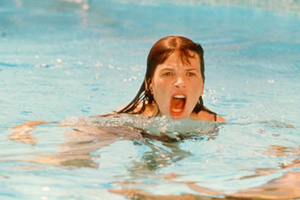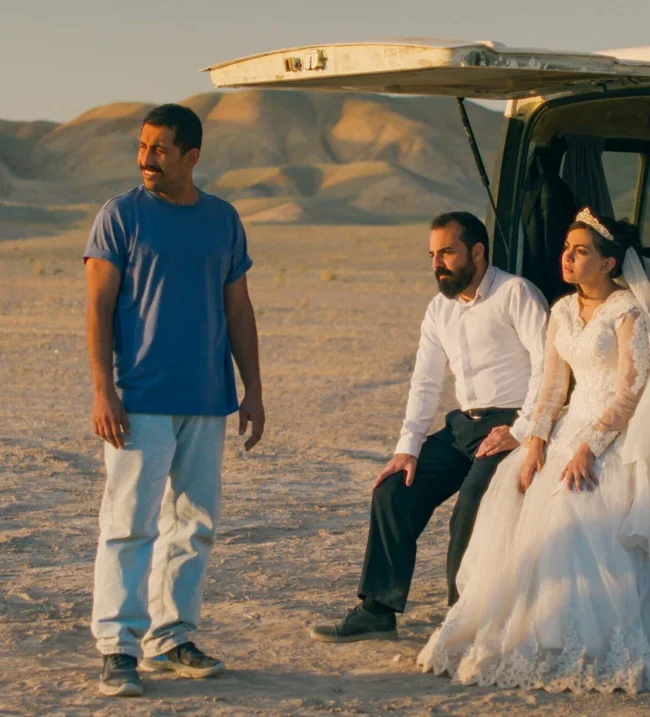Filmmaker Reflections – The 2000s: Vol. 6
(If you haven’t already, please be sure to check out Filmmaker Reflections – The 2000s: Vol. 1 for a series explanation and to read the first batch of reflections.)
Filmmaker Reflections – The 2000s: Vol. 6
 We would advise anyone interested in learning more about Sweetgrass to visit the film’s official website. Next, watch the trailer. Now, if you’re still interested in Sweetgrass, then you are the audience for this remarkable film. It’s not flashy; it doesn’t contain heart-racing drama. Rather, it’s a subtle, beautiful film about sheep, their herders, and the landscapes of sound and vision in which they navigate. It lulled us into another world so deeply that we could have watched 101 more minutes. Sweetgrass’s rhythm is a procession of soundscapes and landscapes that could have been drab, empty, and soulless. In the hands, eyes, and ears of filmmaking pair Ilisa Barbash and Lucien Castaing-Taylor, Sweetgrass is pure cinema. Months after watching it at the New York Film Festival, it easily stays with us. Films like Sweetgrass transform filmmaking into breathing. The storytelling seems so effortless and it flows naturally. However, what happens behind the camera and microphone is months (and years) of living with the sheep and herders that only committed, dedicated, and curious filmmakers would endure. By living in the fields, the filmmakers captured the sounds and textures of the environment that today have passed. It’s in this mixture of Anthropology and Visual Studies—which comes from Castaing-Taylor and Barbash’s background—that leave the audience with a heightened experience, connection, and entry into another world. — David Redmon and Ashley Sabin (Intimidad, Invisible Girlfriend, Kamp Katrina)
We would advise anyone interested in learning more about Sweetgrass to visit the film’s official website. Next, watch the trailer. Now, if you’re still interested in Sweetgrass, then you are the audience for this remarkable film. It’s not flashy; it doesn’t contain heart-racing drama. Rather, it’s a subtle, beautiful film about sheep, their herders, and the landscapes of sound and vision in which they navigate. It lulled us into another world so deeply that we could have watched 101 more minutes. Sweetgrass’s rhythm is a procession of soundscapes and landscapes that could have been drab, empty, and soulless. In the hands, eyes, and ears of filmmaking pair Ilisa Barbash and Lucien Castaing-Taylor, Sweetgrass is pure cinema. Months after watching it at the New York Film Festival, it easily stays with us. Films like Sweetgrass transform filmmaking into breathing. The storytelling seems so effortless and it flows naturally. However, what happens behind the camera and microphone is months (and years) of living with the sheep and herders that only committed, dedicated, and curious filmmakers would endure. By living in the fields, the filmmakers captured the sounds and textures of the environment that today have passed. It’s in this mixture of Anthropology and Visual Studies—which comes from Castaing-Taylor and Barbash’s background—that leave the audience with a heightened experience, connection, and entry into another world. — David Redmon and Ashley Sabin (Intimidad, Invisible Girlfriend, Kamp Katrina)
****************************************************************************************************************************************************************
Slumdog Millionaire — Best Picture winner based on a game show, complete with the game show’s theme at the climax. Also, a guy cuts a girl’s face, then has a change of heart and sets her free. A story never need get in the way of the third act. — Matthew Robison (We Fun, Silver Jew)
****************************************************************************************************************************************************************
 Pound for pound I would put Clint Eastwood’s output over the past decade up against anyone’s. While I don’t think Changeling is his best film of this century, I believe it is a solid representation of what makes Eastwood great. It’s engrossing, intense, gorgeous, goofy and occasionally sloppy. Overall it’s the work of a supremely confident filmmaker. Eastwood doesn’t dillydally while making his films, shooting few takes with minimal fuss. This method sometimes backfires, and even in his most sublime movies there are uneven moments. In Changeling, for example, the mental hospital scenes border on parody. The film is overlong, certain stretches drag and there are too many endings. But that’s OK. Rarely is a Clint Eastwood film without flaws. And it’s the peaks and valleys that are part of the fun. On top of that, his movies possess a visceral gravitas. It’s the same reason why I like punk rock. It feels like it’s made by a human being. While Changeling is not at the level of something like The Unforgiven, there is a lot to recommend here. You have some stunning performances—John Malkovich, Jeffrey Donovan and Angelina Jolie are all stellar. And the atmosphere he creates with 1920s Los Angeles is breathtaking. Also fascinating is the corruption depicted within the LAPD and how it spills over to the community at large.
Pound for pound I would put Clint Eastwood’s output over the past decade up against anyone’s. While I don’t think Changeling is his best film of this century, I believe it is a solid representation of what makes Eastwood great. It’s engrossing, intense, gorgeous, goofy and occasionally sloppy. Overall it’s the work of a supremely confident filmmaker. Eastwood doesn’t dillydally while making his films, shooting few takes with minimal fuss. This method sometimes backfires, and even in his most sublime movies there are uneven moments. In Changeling, for example, the mental hospital scenes border on parody. The film is overlong, certain stretches drag and there are too many endings. But that’s OK. Rarely is a Clint Eastwood film without flaws. And it’s the peaks and valleys that are part of the fun. On top of that, his movies possess a visceral gravitas. It’s the same reason why I like punk rock. It feels like it’s made by a human being. While Changeling is not at the level of something like The Unforgiven, there is a lot to recommend here. You have some stunning performances—John Malkovich, Jeffrey Donovan and Angelina Jolie are all stellar. And the atmosphere he creates with 1920s Los Angeles is breathtaking. Also fascinating is the corruption depicted within the LAPD and how it spills over to the community at large.
A friend of mine complimentarily describes Clint Eastwood’s films as “old man movies”. There might be some truth to that, but if you go back and compare his first film as a director, Play Misty For Me, or something mid-career like Firefox, to a more recent work like Changeling, aesthetically little has changed. He’s largely consistent, always in command of subject and story, and as a soon to be octogenarian, does not appear to be slowing down. I find that incredibly inspiring. That being said, my admiration for his output over the past decade does have its limits, and that would be Blood Work. — Paul Lovelace (The Holy Modal Rounders: Bound to Lose)
****************************************************************************************************************************************************************
I remember the first time I saw a film by Michael Haneke.
 Sean [Durkin], my producing partner, was in the NYU viewing library and had just finished watching a film. It was called Code Unknown. I remember him showing me two scenes in particular—the one with [Juliette] Binoche in the red room performing a scene for the film in the film, and the second was the subway ride where she is spat on. I just remember being completely blown away and excited by what he was doing (and not doing in some ways). As soon as I could, I watched the entire film. He was able to create so much tension out of nothing, by exercising an amazing amount of restraint, and trusting his performers (and his audience) to give themselves into the reality of the moment. Even the use of black frames in between each scene—not only did it simply and subtly transition you from story and sometimes one part of the world to another but also gave you that brief moment of breath in between these weighty scenes. When I saw Code Unknown and subsequently all of Haneke’s films, I discovered a completely new cinematic language that made total sense to me.
Sean [Durkin], my producing partner, was in the NYU viewing library and had just finished watching a film. It was called Code Unknown. I remember him showing me two scenes in particular—the one with [Juliette] Binoche in the red room performing a scene for the film in the film, and the second was the subway ride where she is spat on. I just remember being completely blown away and excited by what he was doing (and not doing in some ways). As soon as I could, I watched the entire film. He was able to create so much tension out of nothing, by exercising an amazing amount of restraint, and trusting his performers (and his audience) to give themselves into the reality of the moment. Even the use of black frames in between each scene—not only did it simply and subtly transition you from story and sometimes one part of the world to another but also gave you that brief moment of breath in between these weighty scenes. When I saw Code Unknown and subsequently all of Haneke’s films, I discovered a completely new cinematic language that made total sense to me.
On a side note, I met Michael Haneke in 2007 at a MoMA screening of Funny Games. A friend of mine who knew Haneke introduced me to him and the “in” he used to start the conversation was that the last shot of Afterschool, where Rob looks towards camera, was an homage of sorts to Funny Games (I learned a great deal from Haneke and his films, but that shot had nothing to with Funny Games; I owe more to The 400 Blows for that shot than to any other film). I expected an “Oh, isn’t that nice…” To my surprise, Haneke gave a big laugh and in a thick Austrian accent said, “Ya ya, you know where I got that from? Tom Jones. Albert Finney is always talking to the camera!” Even the greats, your idols borrow ideas sometimes. A good idea is a good idea, doesn’t matter who came up with it. — Antonio Campos (Afterschool)
****************************************************************************************************************************************************************
ALSO READ:
Filmmaker Reflections – The 2000s: Vol. 1
Filmmaker Reflections – The 2000s: Vol. 2
Filmmaker Reflections – The 2000s: Vol. 3
Filmmaker Reflections – The 2000s: Vol. 4
Filmmaker Reflections – The 2000s: Vol. 5











